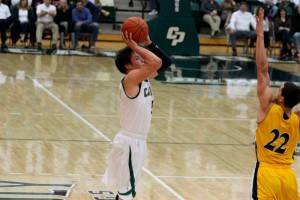Fansmanship Podcast Episode 217 – Chris Sylvester and Brint Wahlberg
It’s another podcast episode! Cal Poly basketball teams are at the Big...

Reese Morgan dropped 26 points in his first career start for Cal Poly. By Owen Main
I woke up at 3:00 AM this morning with a start. Amongst a rogue fire alarm and a heated contest between Cal Poly and UCSB, I thought I had missed something during last night’s game.
It turned out the chants of the UCSB student section at the Thunderdome had me barking up the wrong tree.
Twice last night the officials stopped the game because of the clock not moving on an in-bound play. Both times were when Cal Poly had possession. The first time it happened, it looked like the scorer’s table reset the clock and scoreboard, both of which went blank and turned back on. The mishap was noticed 3 seconds into the 35 second clock and it seemed that no harm was done.
The second time, however, elicited a much different reaction from Cal Poly head coach Joe Callero. With the Mustangs taking the ball out at their own baseline and 6 seconds remaining on the 35-second clock, the ball came in bounds. About a second before Chris Eversley caught and drained a 17-footer off a designed in-bound play, an official noticed that neither clock wasn’t running and blew his whistle. And Callero snapped.
If it had been the first time, it might have just been dubious. The second time, in a game like this though didn’t sit well with the Mustangs coach. Instead of putting the shot clock back to 6 seconds and running the play over, they only put two seconds on the shot clock and gave the Mustangs the ball back out of bounds. What resulted was a contested in-bounds pass, an air ball and a shot clock violation. Two possessions and a whistle later, Callero’s riding of the UCSB shot clock official caused Gaucho head coach Bob Williams to come running at Callero to tell him “that was enough” according to Williams.
In the middle of this fracas, I thought I had missed something very important. See, I thought the game clock had run when the shot clock was stuck. I was wrong about that part. Neither clock had moved.
As a high school assistant coach, I’ve run a shot clock before. Lots of times. And when you run the shot clock, you have one button to push. It’s labeled “reset.” The clock itself, I think, should be running when the scoreboard operator runs the game clock. So, I see two scenarios here:
1) Human error. The shot clock operator did not flip the switch or press the button. It happens, I suppose. In the middle of a heated, loud rivalry game would be a time that it’s probably most likely and least acceptable to happen. I’m pretty sure this was the case, and that’s why Joe Callero was fuming at the scorer’s table.
2) It was an electronic error. Electronic errors don’t usually just happen. I don’t know the answers, but I’ll be interested to know whether these things have happened with the shot clock in the past at the Thunderdome and whether they happen at all for the rest of the year. I can’t imagine that the clock wouldn’t run if the switch was flipped, but stranger things have happened.
OK, there is one other explanation. It’s a loose/not tied-down cable somewhere. On the opposite side of the court, below the student section, sat ESPN Radio 1280’s Tom Barket and Mike Wozniak, along with a number of other media, including myself. While things ran smoothly for the entire game, a few students jumped over and around the table after the game. An unsecured cord that powered the entire table, including the Mustangs’ radio broadcast, was inadvertently unplugged for about 5 minutes. So maybe there’s a loose cord somewhere that they just didn’t find the first time.
If someone can give me another possibility, I’d sure be happy to hear it. Perhaps I’m misinformed about what the real issue was. I guess it doesn’t matter now. As Joe Callero said after the game, there were 60 other possessions for Cal Poly to make a difference, and the Mustangs didn’t do enough to earn the victory.
No matter the reason, this game will go down in Blue-Green rivalry lore as another one that got away from Cal Poly, who is now 1-11 over the past 12 games against their Central Coast rivals.
It’s another podcast episode! Cal Poly basketball teams are at the Big...
One of my favorite authors, Jeff Pearlman joins this edition of the...
Donovan Fields is one of the most joyous basketball players I’ve ever...
With the tournament more than underway and the sweet sixteen fast approaching,...
(Article by Luke “Loco” Johnson. Forgive website faux pas.) The genius of...
* Team Records accurate as of Friday morning, 8:39 A.M. The hyped hoopla...
